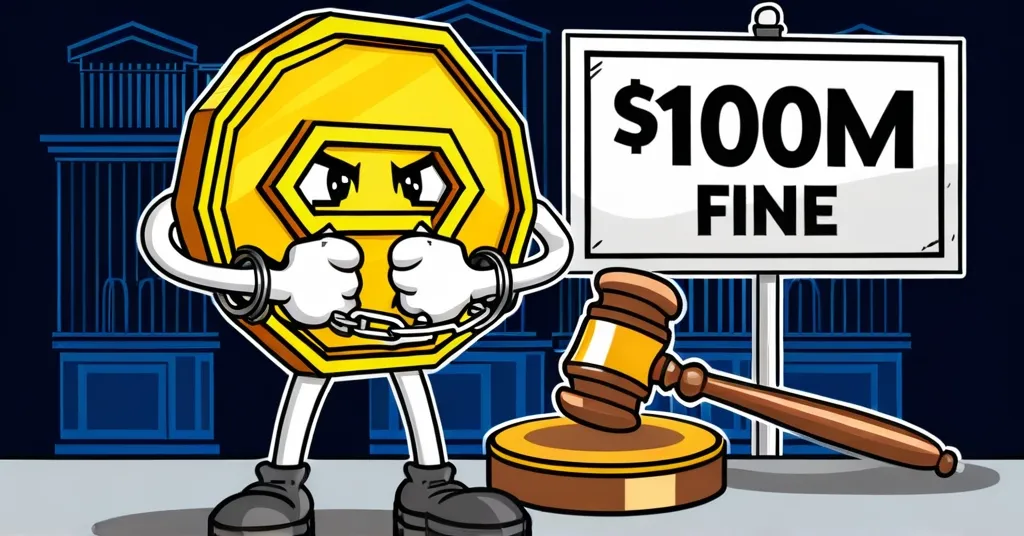BitMEX Fined $100 Million for AML and BSA Violations: A Crypto Compliance Wake-Up Call

BitMEX Hit with $100 Million Penalty for Anti-Money Laundering Violations
Can a crypto exchange thrive while ignoring the law? BitMEX’s $100 million fine says no. The Department of Justice (DoJ) has come down hard on the exchange for failing to comply with the U.S. Bank Secrecy Act (BSA), which requires financial institutions to assist in detecting and preventing money laundering.
- BitMEX fined $100 million for AML and BSA violations
- Fine negotiated down from $200 million requested by DoJ
- Founders knew of non-compliance since 2020
- Guilty plea entered in July 2024
- Two-year probationary period imposed
BitMEX, a prominent name in the cryptocurrency trading world, has been hit with a $100 million penalty for its failure to adhere to the Bank Secrecy Act (BSA) and implement adequate anti-money laundering (AML) and Know Your Customer (KYC) measures. The BSA is a U.S. law that compels financial institutions to help detect and prevent money laundering, while AML and KYC procedures are essential safeguards against illicit financial activities. The DoJ originally sought a $200 million fine, but after negotiations, the penalty was reduced to $100 million, signaling the seriousness of BitMEX’s violations yet also a pathway to resolution.
BitMEX’s founders, Benjamin Delo, Samuel Reed, and Arthur Hayes, were aware of the platform’s non-compliance since at least 2020 but chose to overlook it. This oversight allowed illicit transactions to flow unchecked, leading to a significant breach of the BSA. In July 2024, BitMEX entered a guilty plea, acknowledging its failures. As a result, the platform now faces a two-year probationary period during which it must overhaul its compliance practices to meet legal standards.
Judge John Koeltl, presiding over the case, highlighted the severity of BitMEX’s actions. As reported by Reuters Legal, “Cryptocurrency exchange BitMEX has been fined $100 million for violating the federal Bank Secrecy Act by failing to adequately police money laundering, the DOJ said.”
The Penalty
The $100 million fine imposed on BitMEX is a stark reminder of the consequences of neglecting regulatory compliance. The DoJ’s decision to settle for half of the originally requested $200 million suggests a balance between punishment and the possibility of redemption through improved compliance practices. BitMEX thought it could dance around the rules like a crypto ballerina, but the DOJ brought down the curtain with a hefty fine.
Founders’ Oversight
The founders of BitMEX played fast and loose with regulations, and now they’re paying the price—a hefty $100 million fine. Their awareness and subsequent inaction since 2020 indicate a deliberate choice to prioritize profit over compliance. This negligence not only endangered the platform but also its users, who unknowingly engaged in transactions that could be linked to illicit activities.
Legal Proceedings
In July 2024, BitMEX’s guilty plea marked a significant moment in the legal battle. The Southern District of New York U.S. Attorney’s Office declared BitMEX’s actions a deliberate breach of the law, leading to the imposition of a two-year probationary period. During this time, BitMEX must demonstrate a commitment to enhancing its compliance measures to prevent future violations.
Industry Impact
This case is more than just a financial penalty for BitMEX; it’s a wake-up call for the entire cryptocurrency industry. The delicate balance between the core principles of decentralization, privacy, and freedom that many in the crypto space champion, and the necessity of regulatory compliance, is a tightrope walk. This fine and the subsequent probationary period could set the stage for a new era of stricter oversight, affecting how other platforms navigate the complex world of financial regulations.
As the crypto industry continues to disrupt the status quo, cases like BitMEX’s serve as a reminder of the ongoing tension between innovation and regulation. While effective accelerationism drives the sector forward, it’s crucial to acknowledge the dark sides and challenges, like those highlighted in this case. The industry must find a way to uphold its ideals while ensuring it doesn’t become a haven for illicit activities.
Counterpoints and Perspectives
Some might argue that the severity of BitMEX’s fine is disproportionate to the violations, suggesting that the DoJ’s actions could stifle innovation in the crypto space. Others may defend BitMEX’s actions, citing the challenges of implementing robust AML and KYC measures in a decentralized environment. However, the reality is that compliance is non-negotiable, and platforms must find ways to reconcile their operational models with regulatory requirements.
Key Takeaways and Questions
What led to BitMEX being fined $100 million?
BitMEX was fined for violating the US Bank Secrecy Act and failing to implement proper AML and KYC procedures, which enabled illicit transactions on its platform.
How does the fine affect BitMEX’s founders?
The founders, Benjamin Delo, Samuel Reed, and Arthur Hayes, face legal repercussions due to their awareness and oversight of the non-compliance since 2020.
What is the significance of the two-year probationary period for BitMEX?
The probationary period requires BitMEX to enhance its compliance practices and demonstrate adherence to the law, ensuring future violations are prevented.
How might this penalty impact the broader cryptocurrency industry?
The penalty may set a precedent for stricter regulations, potentially leading to a more regulated environment across the crypto industry.
What does this case reveal about the tension between cryptocurrency and regulatory compliance?
It highlights the ongoing struggle between maintaining the decentralized ethos of cryptocurrencies and adhering to traditional financial regulations aimed at preventing financial crimes.



